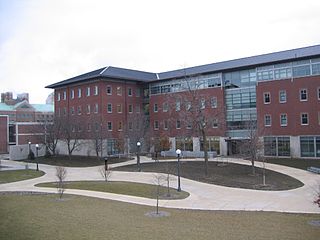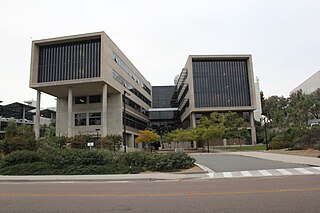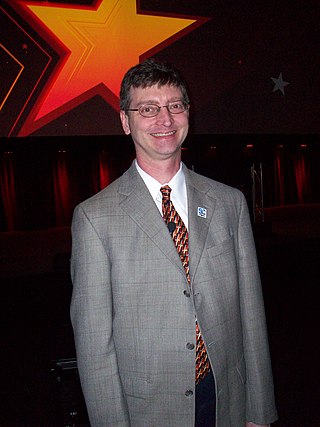Related Research Articles

The National Center for Supercomputing Applications (NCSA) is a state-federal partnership to develop and deploy national-scale cyberinfrastructure that advances research, science and engineering based in the United States. NCSA operates as a unit of the University of Illinois Urbana-Champaign, and provides high-performance computing resources to researchers across the country. Support for NCSA comes from the National Science Foundation, the state of Illinois, the University of Illinois, business and industry partners, and other federal agencies.

The San Diego Supercomputer Center (SDSC) is an organized research unit of the University of California, San Diego (UCSD). SDSC is located at the UCSD campus' Eleanor Roosevelt College east end, immediately north the Hopkins Parking Structure.
Donna J. Cox is an American artist and scientist, Michael Aiken Endowed Chair; Professor of Art + Design; Director, Advanced Visualization Lab at the University of Illinois at Urbana-Champaign (UIUC); Director, Visualization and Experimental Technologies at National Center for Supercomputing Applications (NCSA); and Director, edream. She is a recognized pioneer in computer art and scientific visualization, specifically cinematic scientific visualization.

David A. Bader is a Distinguished Professor and Director of the Institute for Data Science at the New Jersey Institute of Technology. Previously, he served as the Chair of the Georgia Institute of Technology School of Computational Science & Engineering, where he was also a founding professor, and the executive director of High-Performance Computing at the Georgia Tech College of Computing. In 2007, he was named the first director of the Sony Toshiba IBM Center of Competence for the Cell Processor at Georgia Tech.

TeraGrid was an e-Science grid computing infrastructure combining resources at eleven partner sites. The project started in 2001 and operated from 2004 through 2011.

Larry Lee Smarr is a physicist and leader in scientific computing, supercomputer applications, and Internet infrastructure from Missouri. He currently works at the University of California, San Diego. Smarr has been among the most important synthesizers and conductors of innovation, discovery, and commercialization of new technologies – including areas as disparate as the Web browser and personalized medicine. In his career, Smarr has made pioneering breakthroughs in research on black holes, spearheaded the use of supercomputers for academic research, and presided over some of the major innovations that created the modern Internet. For nearly 20 years, he has been building a new model for academic research based on interdisciplinary collaboration.
Wen-mei Hwu is the Walter J. Sanders III-AMD Endowed Chair professor in Electrical and Computer Engineering in the Coordinated Science Laboratory at the University of Illinois at Urbana-Champaign. His research is on compiler design, computer architecture, computer microarchitecture, and parallel processing. He is a principal investigator for the petascale Blue Waters supercomputer, is co-director of the Universal Parallel Computing Research Center (UPCRC), and is principal investigator for the first NVIDIA CUDA Center of Excellence at UIUC. At the Illinois Coordinated Science Lab, Hwu leads the IMPACT Research Group and is director of the OpenIMPACT project – which has delivered new compiler and computer architecture technologies to the computer industry since 1987. From 1997 to 1999, Hwu served as the chairman of the Computer Engineering Program at Illinois. Since 2009, Hwu has served as chief technology officer at MulticoreWare Inc., leading the development of compiler tools for heterogeneous platforms. The OpenCL compilers developed by his team at MulticoreWare are based on the LLVM framework and have been deployed by leading semiconductor companies. In 2020, Hwu retired after serving 33 years in University of Illinois at Urbana-Champaign. Currently, Hwu is a Senior Distinguished Research Scientist at Nvidia Research and Emeritus Professor at University of Illinois at Urbana-Champaign.
The Center for Computation and Technology (CCT) is an interdisciplinary research center located on the campus of Louisiana State University in Baton Rouge, Louisiana.
Kevin Franklin, EdD was born in Virginia, where he received degrees in psychology and education from Old Dominion University. He holds a Doctorate of Education in organization and leadership from the University of San Francisco. Formerly executive director of the University of California system-wide Humanities Research Institute (UCHRI) and a deputy director of the San Diego Supercomputer Center (SDSC), Franklin was appointed as executive director of the Institute for Computing in Humanities, Arts, and Social Science, (I-CHASS), research professor, education policy, organization and leadership, adjunct associate professor, African American studies, and senior research scientist for the National Center for Supercomputing Applications at the University of Illinois in July 2007. In addition Franklin was appointed associate director for the National Center for Supercomputing Applications (NCSA) in 2014.
The Institute for Computing in Humanities, Arts, and Social Science (I-CHASS) at the University of Illinois at Urbana–Champaign was established in 2005 to conduct research at the intersection of high performance computing and humanities, arts, and social science. I-CHASS is hosted by the National Center for Supercomputing Applications (NCSA) and maintains strategic partnerships with NCSA, the Great Lakes Consortium for Petascale Computation (GLCPC), and the Illinois Informatics Institute (I3).

William Douglas Gropp is the director of the National Center for Supercomputing Applications (NCSA) and the Thomas M. Siebel Chair in the Department of Computer Science at the University of Illinois at Urbana–Champaign. He is also the founding Director of the Parallel Computing Institute. Gropp helped to create the Message Passing Interface, also known as MPI, and the Portable, Extensible Toolkit for Scientific Computation, also known as PETSc.
The Sidney Fernbach Award established in 1992 by the IEEE Computer Society, in memory of Sidney Fernbach, one of the pioneers in the development and application of high performance computers for the solution of large computational problems as the Division Chief for the Computation Division at Lawrence Livermore Laboratory from the late 1950s through the 1970s. A certificate and $2,000 are awarded for outstanding contributions in the application of high performance computers using innovative approaches. The nomination deadline is 1 July each year.
Roscoe C. Giles, III is an American physicist and computer engineer. He was the deputy director of Boston University's Center for Computational Science. He is also a professor of computer and electrical engineering at Boston University College of Engineering, with a joint appointment in physics.

Christopher Ray Johnson is an American computer scientist. He is a distinguished professor of computer science at the University of Utah, and founding director of the Scientific Computing and Imaging Institute (SCI). His research interests are in the areas of scientific computing and scientific visualization.

James Weldon Demmel Jr. is an American mathematician and computer scientist, the Dr. Richard Carl Dehmel Distinguished Professor of Mathematics and Computer Science at the University of California, Berkeley.
Laxmikant (Sanjay) V. Kale is the director of the Parallel Programming Laboratory (PPL) and a professor of computer science at the University of Illinois at Urbana-Champaign. He also holds department affiliations with the Beckman Institute and the Department of Mechanical and Industrial Engineering at Illinois.

Francine Berman is an American computer scientist, and a leader in digital data preservation and cyber-infrastructure. In 2009, she was the inaugural recipient of the IEEE/ACM-CS Ken Kennedy Award "for her influential leadership in the design, development and deployment of national-scale cyberinfrastructure, her inspiring work as a teacher and mentor, and her exemplary service to the high performance community". In 2004, Business Week called her the "reigning teraflop queen".

The University of Illinois Department of Computer Science is the academic department encompassing the discipline of computer science at the University of Illinois Urbana-Champaign. According to U.S. News & World Report, both its undergraduate and graduate programs rank in the top five among American universities, and according to Computer Science Open Rankings, the department ranks equally high in placing Ph.D. students in tenure-track positions at top universities and winning best paper awards. The department also ranks in the top two among all universities for faculty submissions to reputable journals and academic conferences, as determined by CSRankings.org. From before its official founding in 1964 to today, the department's faculty members and alumni have contributed to projects including the ORDVAC, PLATO, Mosaic, JavaScript and LLVM, and have founded companies including Siebel Systems, Netscape, Mozilla, PayPal, Yelp, YouTube, and Malwarebytes.
Satoshi Matsuoka is a Japanese computer scientist and the current head of the Riken Center for Computational Science (R-CCS) at RIKEN, the largest Supercomputing center in Japan.
Gabrielle D. Allen is a British and American computational astrophysicist known for her work in astrophysical simulations and multi-messenger astronomy, and as one of the original developers of the Cactus Framework for parallel scientific computation. She is a professor of mathematics and statistics at the University of Wyoming.
References
- ↑ "Trustees Select Seidel as UW's 28th President" . Retrieved March 5, 2020.
- ↑ Edward Seidelvpedi.uillinois.edu Archived September 16, 2018, at the Wayback Machine
- ↑ "Edward Seidel". Grainger Engineering Office of Marketing and. Retrieved September 14, 2020.
- ↑ NCSA director Edward Seidel He is a distinguished researcher in high-performance computing and relativity and astrophysics with an outstanding track record as an administrator. In addition to leading NCSA, he is also a Founder Professor in the University of Illinois Department of Physics and a professor in the Department of Astronomy.
- ↑ "H. Edward Seidel the senior vice president of research and innovation at Moscow's Skolkovo Institute of Science and Technology, has been named the director of the National Center for Supercomputing Applications at Illinois."
- ↑ Director, National Center for Supercomputing Applications LinkedIn [ better source needed ]
- ↑ Karin Fischer (October 15, 2012). "To Spur Interdisciplinary Research, an Astrophysicist Moves to Russia". The Chronicle of Higher Education.
- ↑ "Edward Seidel". Skolkovo Institute of Science and Technology. Retrieved November 23, 2012.[ permanent dead link ]
- ↑ "LSU Center for Computation & Technology Director To Head National Science Foundation's Office of Cyberinfrastructure" (Press release). National Science Foundation. June 10, 2008. Retrieved October 14, 2011.
- ↑ TeraGrid '11: Ed Seidel , retrieved July 28, 2022
- ↑ "Edward Seidel". scholar.google.com. Retrieved July 28, 2022.
- ↑ "About Sidney Fernbach | IEEE Computer Society". April 9, 2018.
- ↑ Brooks, David (December 26, 2014). "Opinion | The Sidney Awards, Part I". The New York Times. ISSN 0362-4331 . Retrieved July 28, 2022.
- ↑ Brooks, David (December 30, 2014). "Opinion | The Sidney Awards, Part 2". The New York Times. ISSN 0362-4331 . Retrieved July 28, 2022.
- ↑ "Edward Seidel 2006 Sidney Fernbach Award Recipient". IEEE Computer Society Awards. IEEE Computer Society. Archived from the original on August 15, 2011. Retrieved October 14, 2011.
- ↑ "Edward Seidel: 2006 Sidney Fernbach Award Recipient". Archived from the original on August 15, 2011. Retrieved October 14, 2011.
- ↑ "Home". www.billingpreis.mpg.de. Retrieved July 28, 2022.
- ↑ Ed Seidel